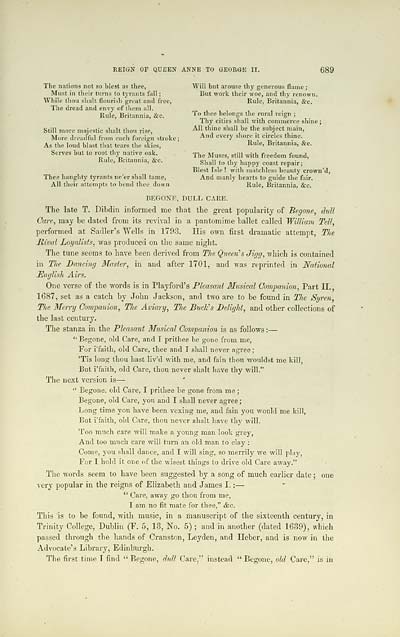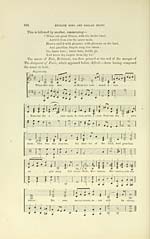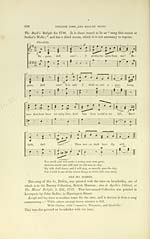Glen Collection of printed music > Printed text > Popular music of the olden time > Volume 2
(313) Page 689 - Begone, dull care
Download files
Complete book:
Individual page:
Thumbnail gallery: Grid view | List view

REIGN OF QUEEN ANNE TO GEORGE II.
689
The nations not so blest as thee,
Must in their turns to tyrants fall ;
While thou shalt flourish great and free,
The dread and envy of them all.
Rule, Britannia, &c.
Still more majestic shalt thou rise,
More dreadful from each foreign stroke ;
As the loud blast that tears the skies,
Serves but to root thy native oak.
Rule, Britannia, &c.
Thee haughty tyrants ne'er shall tame,
All their attempts to bend thee down
Will but arouse thy generous flame;
But work their woe, and thy renown.
Rule, Britannia, &c.
To thee belongs the rural reign ;
Thy cities shall with commerce shine ;
All thine shall be the subject main,
And every shore it circles thine.
Rule, Britannia, &c.
The Muses, still with freedom found,
Shall to thy happy coast repair;
Blest Isle ! with matchless beauty crown 'd,
And manly hearts to guide the fair.
Rule, Britannia, &c.
BEGONE, DULL CARE.
The late T. Dibdin informed me that the great popularity of Begone, dull
Care, may be dated from its revival in a pantomime ballet called William Tell,
performed at Sadler's Wells in 1793. His own first dramatic attempt, The
Rival Loyalists, was produced on the same night.
The tune seems to have been derived from The Queen's Jigg, which is contained
in The Dancing Master, in and after 1701, and was reprinted in National
English Airs.
One verse of the words is in Playford's Pleasant Musical Companion, Part II.,
1687, set as a catch by John Jackson, and two are to be found in The Syren,
The Merry Companion, The Aviary, The Buck's Delight, and other collections of
the last century.
The stanza in the Pleasant Musical Companion is as follows : —
" Begone, old Care, and I prithee be gone from me,
For i'faith, old Care, thee and I shall never agree ;
'Tis long thou hast liv'd with me, and fain thou wouldst me kill,
But i'faith, old Care, thou never shalt have thy will."
The next version is — '
" Begone, old Care, I prithee be gone from me ;
Begone, old Care, you and I shall never agree ;
Long time you have been vexing me, and fain you would me kill,
But i'faith, old Care, thou never shalt have thy will.
Too much care will make a young man look grey,
And too much care will turn an old man to clay :
Come, you shall dance, and I will sing, so merrily we will play,
For I hold it one of the wisest things to drive old Care away."
The words seem to have been suggested by a song of much earlier date ; one
very popular in the reigns of Elizabeth and James I. : —
" Care, away go thou from me,
I am no fit mate for thee," &c.
This is to be found, with music, in a manuscript of the sixteenth century, in
Trinity College, Dublin (F. 5, 13, No. 5) ; and in another (dated 1639), which
passed through the hands of Cranston, Leyden, and Heber, and is now in the
Advocate's Library, Edinburgh.
The first time I find " Begone, dull Care." instead " Begone, old Care," is in
689
The nations not so blest as thee,
Must in their turns to tyrants fall ;
While thou shalt flourish great and free,
The dread and envy of them all.
Rule, Britannia, &c.
Still more majestic shalt thou rise,
More dreadful from each foreign stroke ;
As the loud blast that tears the skies,
Serves but to root thy native oak.
Rule, Britannia, &c.
Thee haughty tyrants ne'er shall tame,
All their attempts to bend thee down
Will but arouse thy generous flame;
But work their woe, and thy renown.
Rule, Britannia, &c.
To thee belongs the rural reign ;
Thy cities shall with commerce shine ;
All thine shall be the subject main,
And every shore it circles thine.
Rule, Britannia, &c.
The Muses, still with freedom found,
Shall to thy happy coast repair;
Blest Isle ! with matchless beauty crown 'd,
And manly hearts to guide the fair.
Rule, Britannia, &c.
BEGONE, DULL CARE.
The late T. Dibdin informed me that the great popularity of Begone, dull
Care, may be dated from its revival in a pantomime ballet called William Tell,
performed at Sadler's Wells in 1793. His own first dramatic attempt, The
Rival Loyalists, was produced on the same night.
The tune seems to have been derived from The Queen's Jigg, which is contained
in The Dancing Master, in and after 1701, and was reprinted in National
English Airs.
One verse of the words is in Playford's Pleasant Musical Companion, Part II.,
1687, set as a catch by John Jackson, and two are to be found in The Syren,
The Merry Companion, The Aviary, The Buck's Delight, and other collections of
the last century.
The stanza in the Pleasant Musical Companion is as follows : —
" Begone, old Care, and I prithee be gone from me,
For i'faith, old Care, thee and I shall never agree ;
'Tis long thou hast liv'd with me, and fain thou wouldst me kill,
But i'faith, old Care, thou never shalt have thy will."
The next version is — '
" Begone, old Care, I prithee be gone from me ;
Begone, old Care, you and I shall never agree ;
Long time you have been vexing me, and fain you would me kill,
But i'faith, old Care, thou never shalt have thy will.
Too much care will make a young man look grey,
And too much care will turn an old man to clay :
Come, you shall dance, and I will sing, so merrily we will play,
For I hold it one of the wisest things to drive old Care away."
The words seem to have been suggested by a song of much earlier date ; one
very popular in the reigns of Elizabeth and James I. : —
" Care, away go thou from me,
I am no fit mate for thee," &c.
This is to be found, with music, in a manuscript of the sixteenth century, in
Trinity College, Dublin (F. 5, 13, No. 5) ; and in another (dated 1639), which
passed through the hands of Cranston, Leyden, and Heber, and is now in the
Advocate's Library, Edinburgh.
The first time I find " Begone, dull Care." instead " Begone, old Care," is in
Set display mode to: Large image | Transcription
Images and transcriptions on this page, including medium image downloads, may be used under the Creative Commons Attribution 4.0 International Licence unless otherwise stated. ![]()
| Special collections of printed music > Glen Collection of printed music > Printed text > Popular music of the olden time > Volume 2 > (313) Page 689 - Begone, dull care |
|---|
| Permanent URL | https://digital.nls.uk/91365750 |
|---|
| Shelfmark | Glen.254a |
|---|---|
| Additional NLS resources: | |
| Attribution and copyright: |
|
| Description | Scottish songs and music of the 18th and early 19th centuries, including music for the Highland bagpipe. These are selected items from the collection of John Glen (1833 to 1904). Also includes a few manuscripts, some treatises, and other books on the subject. |
|---|
| Description | The Glen Collection and the Inglis Collection represent mainly 18th and 19th century Scottish music, including Scottish songs. The collections of Berlioz and Verdi collected by bibliographer Cecil Hopkinson contain contemporary and later editions of the works of the two composers Berlioz and Verdi. |
|---|

